After speaking to countless website owners, we’ve seen how choosing the wrong platform can cost you time and money.
At WPBeginner, we use WordPress for our blog and online stores because it offers the features and customization we need to build our websites the way we want.
The truth is, while Weebly offers an easier starting point, it often becomes restrictive as your website grows – and we’ve actually helped countless users migrate from Weebly to WordPress.
In this comparison, we’ll share our real-world experience with both platforms to help you choose the right website builder for you. We’ll break down exactly how WordPress and Weebly stack up in terms of ease of use, flexibility, cost, and more. This way, you can make the right decision for your website.
Note: This article compares Weebly with self-hosted WordPress.org sites, not WordPress.com blogs. See our guide on the difference between WordPress.com vs. WordPress.org for more information.
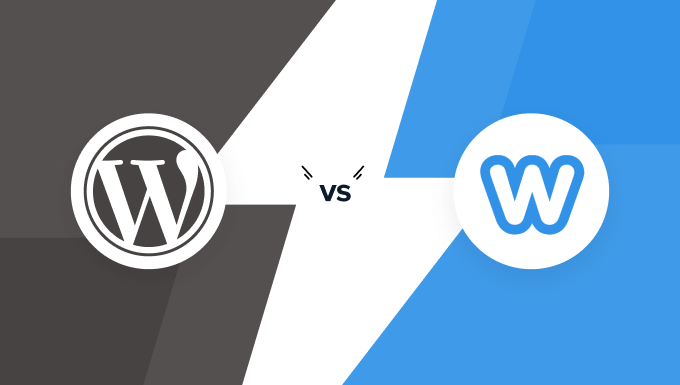
In a rush? Here’s a quick overview of our comparison between Weebly and WordPress:
| Weebly | WordPress | |
| Hosting | Hosted platform | Self-hosted |
| Ease of Use | Beginner-friendly | Slight learning curve |
| Features & Plugins | Limited apps supported | Supports 59,000+ plugins |
| Design & Layout | Drag & drop builder | Full Site Editor + Theme Customizer |
| eCommerce Support | Limited support | Extensive support |
| Data Portability | Very difficult | Very easy and smooth |
| Pricing | Free + Paid | Free |
Weebly vs. WordPress: Hosting Platform
Choosing the right website builder is a big decision, and one of the first things to consider is whether you prefer a self-hosted or a fully hosted platform. Let’s break down what that means for both Weebly and WordPress.
Weebly – Hosted Platform
Weebly is a completely hosted service. This means that your website lives on the Weebly servers, and you have to abide by their terms of service.
The problem is that you don’t truly own all your content. If Weebly decides to change their policies and your content violates their terms of service, then you could lose all your data.
On the flip side, Weebly’s admin dashboard is designed to be user-friendly, providing all the tools you need to build, edit, and manage your Weebly website.
However, a significant drawback of a hosted platform like Weebly is that if you ever decide to move your website to a different platform, the migration process can be extremely difficult.
WordPress – Self-Hosted Platform
In contrast, WordPress is free, open-source software that you install on your own web hosting account.
This means that you own 100% of all your content, and you don’t have to worry about relying on a third-party service to host your website. What’s more, WordPress makes it relatively straightforward to switch to different platforms or hosting providers, should you ever decide to do so.
The good news is that there are lots of WordPress hosting services to choose from. Many of these providers even come with WordPress pre-installed or offer a simple one-click installation process. Opting for a self-hosted platform like WordPress gives you greater flexibility and freedom in managing every aspect of your website
You can see our guide on how to start a WordPress blog (step by step) for more information.
Winner: WordPress
Weebly vs. WordPress: Ease of Use
Choosing a user-friendly platform for building and managing your website is super important.
If the platform has a steep learning curve, you’ll end up spending valuable time trying to figure out how it works instead of focusing on what really matters – growing your business.
So, let’s take a close look at how WordPress and Weebly compare when it comes to ease of use.
Weebly – Ease of Use
Weebly offers a simple and neat interface for users. You get to choose different options from the dashboard, whether you are building a website or viewing reports.
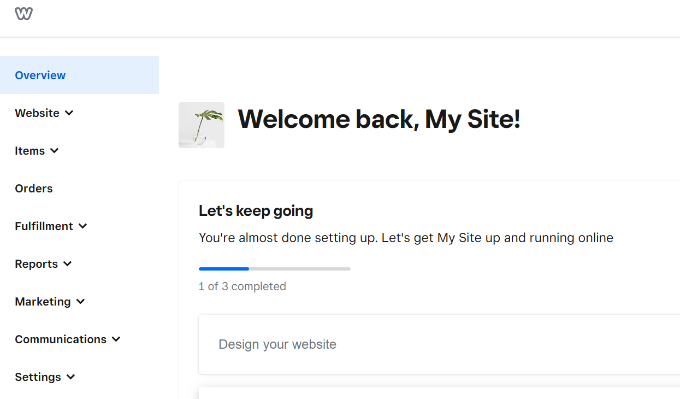
A key feature of Weebly is its intuitive drag-and-drop interface. This lets you visually build your website without needing any coding knowledge. Setting up a website is quick and straightforward, and Weebly manages all the hosting and security for you.
If you need some extra help, then Weebly has a detailed knowledge base filled with helpful support articles. These can be very helpful for beginners who might need a solution if they get stuck during the setup process.
WordPress – Ease of Use
WordPress also offers a user-friendly dashboard and visual editor for creating content. You can easily manage your website from the admin panel.
For instance, it lets you access your blog posts and pages, view comments, manage plugins, and choose a theme from the dashboard.
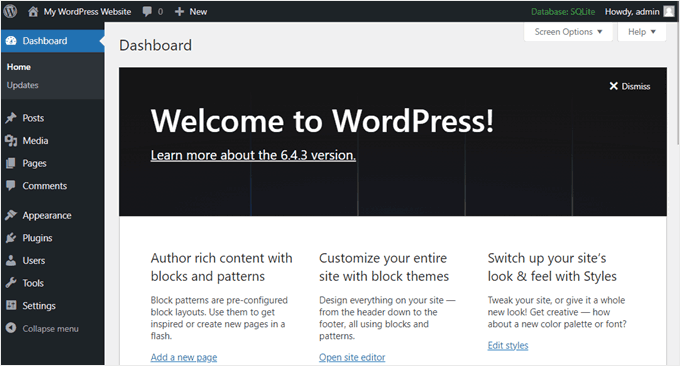
The sheer number of themes and WordPress plugins means you have almost limitless customization possibilities, especially when you compare it to Weebly’s more restricted set of options.
One area where Weebly has a slight advantage over WordPress is that it comes with a prebuilt drag-and-drop visual builder. While the WordPress block editor is intuitive when it comes to creating content, you’ll typically need to install a separate page builder plugin to get true drag-and-drop flexibility.
However, WordPress benefits from a massive and active community and a robust support system. You’ll find an endless supply of tutorials, articles, and videos dedicated to WordPress, making it easy to find solutions to any issues you might encounter.
Winner – Weebly
Weebly vs. WordPress: Features and Plugins
There will almost certainly be times when you need to add extra functionality to your website to accomplish a specific task. In this section, we’ll compare how WordPress and Weebly handle features and the availability of add-ons (plugins for WordPress, apps for Weebly).
Weebly – Features and Plugins
Weebly comes with a good selection of built-in tools. You can use them to create various kinds of websites, including an online store, blog, portfolio, business site, or event page.
However, if you require a feature that isn’t already part of their platform, you’re quite limited. Unlike WordPress, you can’t just hire a developer to build a bespoke solution to extend what Weebly can do.
Weebly does offer different free and paid applications, but the selection is limited and not as extensive as WordPress.
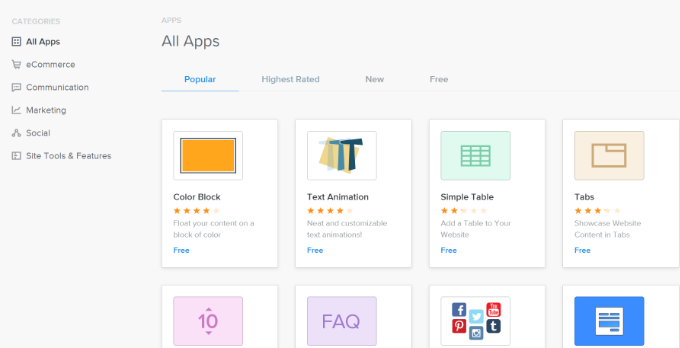
WordPress – Features and Plugins
WordPress, on the other hand, offers virtually any feature you could possibly want for your website.
For instance, you can easily add features for online stores, contact forms, galleries, portfolios, SEO, and more. While many of these features aren’t built into the core WordPress software, you can easily add them using plugins.
There are over 59,000 free plugins available in the official WordPress plugin directory alone. Not to mention, there are countless other premium plugins available from third-party websites.
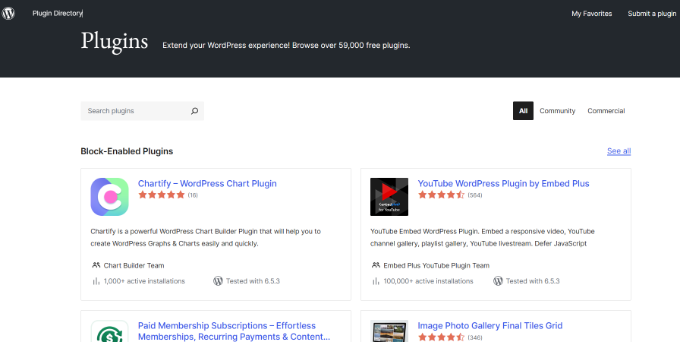
If you can think of a feature, there’s a very good chance that a WordPress plugin already exists to provide it. For example, if you need to create a contact form without writing code, then you can use WPForms.
Also, if you’re looking to optimize your site for search engines, create sitemaps, and fix broken links, then plugins like All in One SEO (AIOSEO) are extremely useful.
Winner: WordPress
WordPress vs. Weebly: Design and Layout Choices
Next up, let’s consider the design and layout options each platform offers. You’ll want a platform that’s easy to use and provides plenty of visual design choices to make your site stand out.
So, let’s see how Weebly and WordPress compare when it comes to design flexibility and customization.
Weebly – Design and Layouts
Weebly truly shines when it comes to design, and arguably, its best feature is its intuitive drag-and-drop page builder.
You can choose from different elements in the left menu. From here, simply drag and drop the elements on your template.
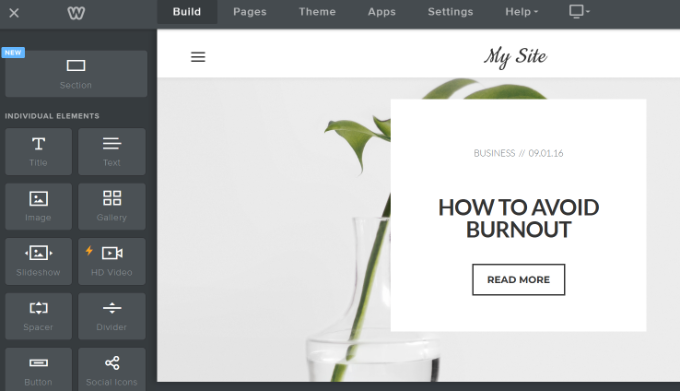
Weebly also offers a good selection of themes that you can further customize using these same drag-and-drop tools.
For example, you’ll find themes specifically designed for stores, business websites, online portfolios, personal websites, events, and much more.
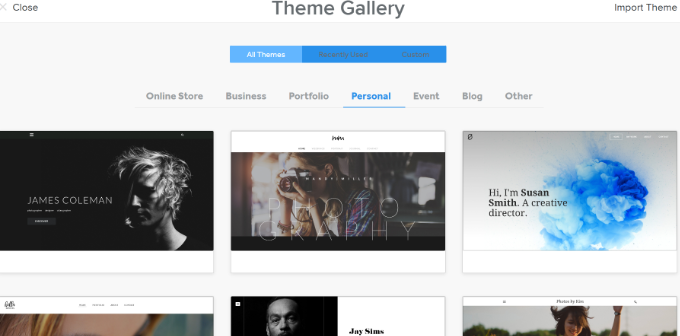
WordPress – Design and Layouts
WordPress also boasts an impressive number of design options, with over 12,000 themes available. You can find themes for all sorts of websites, such as an eCommerce store, business site, wedding website, personal site, and more.
WordPress does not come with a built-in drag-and-drop page builder. However, the newest themes do support the full-site editor, which uses blocks to help you customize your site. It’s similar to the WordPress content editor, where you can add different blocks to edit your site’s appearance.
You can see our list of the best block themes for full site editing in WordPress.
That said, there are some WordPress themes that still use the theme customizer. Depending on the theme you’re using, you can change the background colors, edit your menus, widgets, homepage settings, add custom CSS, and much more.
For more details, you can go through our detailed guide on how to use WordPress theme customizer.
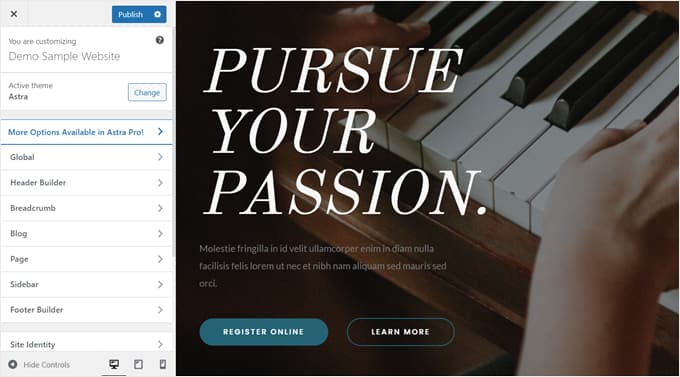
If you’re looking for a drag-and-drop option in WordPress, then you’ll need to use a plugin like SeedProd.
It is the best WordPress page builder and helps you create landing pages, coming soon pages, and more.
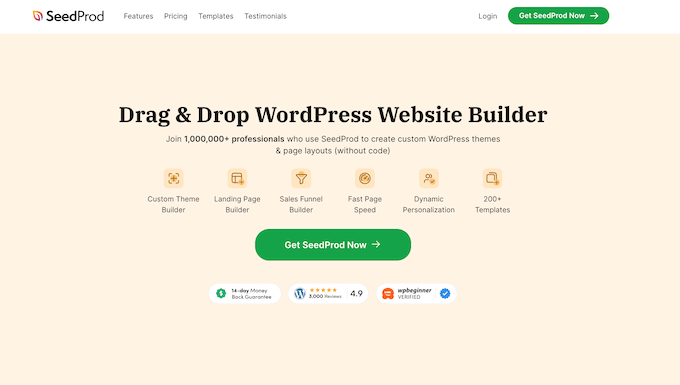
We’ve used SeedProd to design many of our partner sites and have always been happy with the results. To learn more about our experiences with this page builder plugin, check out our detailed SeedProd review.
There are also thousands of pre-made templates that offer drag-drop functionality. You can find many free options in the official WordPress.org themes directory, while others can be purchased from theme shops like StudioPress, Themify, and ThemeLab.
Winner: Tie
WordPress vs. Weebly: Pricing
Cost is always an important factor when you’re deciding which website platform to go with. To help you choose between WordPress and Weebly, let’s take a look at their different pricing structure.
Weebly – Pricing
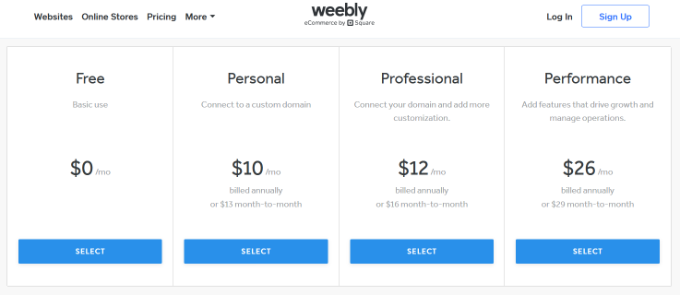
Weebly offers 3 premium pricing plans starting from $10 per month and going all the way up to $26 per month.
You get free SSL certificates in all the plans, including the free option. However, if you want a free domain, unlimited storage, password protection, and other advanced features, then you’ll need to select the Professional or Performance plans.
Weebly also offers a free version, but it has limited features. Plus, your website will have the Weebly branding.
WordPress – Pricing
In contrast, WordPress itself is a free and open-source platform. All you need is a web hosting service and a domain name to get started. However, the total cost of creating a WordPress website will vary depending on your needs.
For instance, you can get a domain and hosting for as low as $2.75 per month, along with a free domain and SSL certificate if you pick a provider like Bluehost. Plus, there are many free WordPress themes and plugins – your initial outlay could be as low as around $10 per year.
However, if you need more advanced features and choose to use premium plugins and themes, your annual costs could potentially exceed $500 per year.
The beauty of WordPress is that you have control over what you spend and can scale your investment as your website grows. You could even partner with a team of experts who can work out a budget and create a WordPress website for you.
Winner: WordPress
Weebly vs. WordPress: eCommerce and Business
Are you looking to start an online store and wondering whether WordPress or Weebly is the better platform for your eCommerce venture?
Let’s compare the eCommerce and business features that both platforms offer to help you make the right choice.
Weebly – eCommerce and Business
Weebly does allow you to set up an online store. However, its eCommerce features are quite basic, and you’ll find there isn’t a great deal of flexibility when it comes to customizing your shop.
One of the positives we noted is that Weebly offers some attractive themes specifically designed for online stores. You can then use their familiar drag-and-drop builder to tweak these themes and add various product display elements.
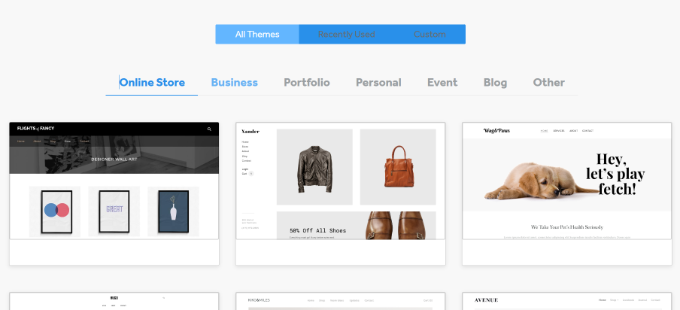
That said, a significant drawback is that Weebly charges a 3% transaction fee on every sale you make. This is in addition to the fees charged by your chosen payment processors, such as Stripe and PayPal. So, you end up paying double transaction fees, which can eat into your profits.
You can avoid this extra fee by upgrading to their Business plan, which costs around $26 per month.
WordPress – eCommerce and Business
WordPress, on the other hand, boasts several powerful and flexible eCommerce plugins that allow you to create your own fully featured online stores. Popular options include WooCommerce, Easy Digital Downloads, iThemes Exchange, WP eCommerce, and several others.
WooCommerce is particularly popular and is one of the leading eCommerce platforms for WordPress. In fact, it powers nearly 38% of all online stores. The best thing about a WooCommerce store is that it’s free to use, beginner-friendly, and highly flexible.
Plus, WooCommerce integrates seamlessly with popular website and page builder plugins like SeedProd, giving you complete control over your store’s design. You can choose from a wide range of themes and tailor them to your exact requirements.
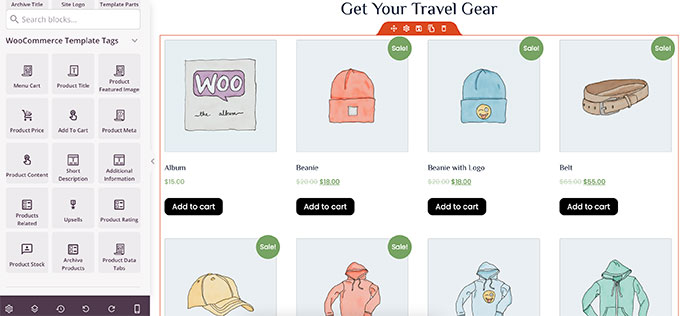
Most WordPress eCommerce platforms also come with dozens of pre-made themes. You can add coupons, customize receipts, and basically do everything you want to do in your online store.
Crucially, WordPress itself does not charge any additional transaction fees on your sales. All you’ll pay are the standard processing fees charged by your chosen payment gateway – which you would have to pay regardless of the platform you use.
To learn more, please see our guide on WooCommerce Made Simple: A Step-by-Step Tutorial [+ Resources].
Winner: WordPress
WordPress vs. Weebly: Data Portability
Data portability is something that many website owners don’t think about when they’re first choosing a platform. However, it’s a crucial factor that determines how easily you can export and import your website content and other important data should you ever need to switch platforms.
WordPress – Data Portability
When you host your website on an open-source platform like WordPress, you can easily export your data into many formats. You can export your WordPress site as an XML file, export your database, or download your files and content.
You can also easily migrate your WordPress site to any other platform that you like. This freedom gives you complete ownership and control over your online presence, which provides significant peace of mind.
Weebly – Data Portability
In contrast, Weebly’s data portability options are quite limited. While they do allow you to download your website as a zip file, this download typically only contains your basic HTML pages and images.
Crucially, if you had a blog on your Weebly site, those posts would generally not be included in the export. Similarly, any slideshows or other advanced features you might have implemented likely wouldn’t function correctly on the exported site. Essentially, moving a website away from Weebly can be a very difficult and often incomplete process.
Recognizing this challenge, we decided to tackle the problem head-on and created a free Weebly to WordPress Importer. For full instructions, see our complete guide on how to move from Weebly to WordPress.
Winner: WordPress
WordPress vs. Weebly – Which One Should You Choose?
After taking a good look at both Weebly and WordPress, our conclusion is that Weebly looks good from the outside, and it can be suitable for small websites. However, it falls short when it comes to creating a proper blog or running a fully functional online store. That simple drag-and-drop builder might catch your eye at first, but appearances can be deceiving.
In the contrast, WordPress gives you the freedom and flexibility to create practically any kind of website. Crucially, WordPress also gives you complete ownership of all your content. Thar said, you’re not reliant on another company that could potentially change its policies or even shut down your site. For any serious website owner, that level of control and future-proofing is invaluable.
We hope this article helped you compare WordPress vs. Weebly and pick a platform for your next website. You may also want to check out our comparison of Squarespace vs. WordPress and how to choose the best blogging platform.
If you liked this article, then please subscribe to our YouTube Channel for WordPress video tutorials. You can also find us on Twitter and Facebook.





Ana
A quick correction: Wordpress has free plug-ins, but you have to pay more starting at $300/yr to be allowed to use plug-ins on your site.
WPBeginner Support
That would be if we were talking about WordPress.com, our article here is about WordPress.org. For the differences between the two you can take a look at our article here: https://www.wpbeginner.com/beginners-guide/self-hosted-wordpress-org-vs-free-wordpress-com-infograph/
Admin
david
I had a client who paid for a nice, dynamic Wordpress website with nice clean polished look. Worked great on mobile and responsive. The client felt it’d be cheaper to have an in-house person maintain the website, they realized Wordpress was to much for them and switched to a Weebly account with a Weebly designed website. The website is no longer coherent, does not allow them to make it work as nicely as it did when it was on Wordpress, it’s obvious the designer doesn’t know how to take control or Weebly doesn’t allow as much customization.. Needless to say the new website is god awful compared to what it was, and the users of the gym have not been thrilled with the dozen extra steps to sort certain pages… I’ve looked at Weebly before I jumped into Wordpress, frankly Weebly might be fine for the individual or small business who knows nothing and doesn’t care about the small things or even big things and are okay with just the basic actions, a waste of money and time, but they are able to convince those who don’t know better and those who are cheap to go with their service. pos in my opinion
karel
Do not use Weebly for a European website!
I made a capital mistake by using weebly. Not at the start but afterwards I realised following:
-They do not connect to European payment methods and do not want to implement this. Unbelievable.
-Not an efficient solution for translations
As weekly was not willing to solve these blocking issues I had to go through the tremendous effort to move my website to a new platform. Please do not make the same mistake as me if you are based in Europe.
Renny
This is a wordpress site!!
Howard
I am totally confused. I was ready to take weebly for blog/web use. I read huge articles how Wordpress.org is more ideal for everything; except the learning time and support maintenance. Now I see themify and headway give you an EASIER drag/ drop solution with Wordpress!! I don’t get it? What is the learning differences between Wordpress and headway vs. weebly, square space, etc. besides all the attributes I know come with understanding how to use Wordpress and the time…. It takes to learn the darn program? ( it’s work enough writing good content which is why I opted to try, FINALLY , to try weebly after racking my brain for a month???????
Thanks
Howard
Suzanne Naranjo
I have used Weebly to build simple websites. I am scared of WP. Weebly is easy as long as you pay for at least the Starter version. Don’t bother w the free version. Whatever you want to do in Weebly, go to their support or google your question. Follow the steps, and you will be able to do a lot.
Weebly doesn’t have their own calendar. If you want a calendar, you have to create one, for example using Google. Adjust the Google settings to share the calendar. Then go into Weebly and tell it to use the calendar as a page. Your viewers won’t be able to tell that the calendar is separate.
Faye
I just started working with Weebly and to say that it’s a nightmare is putting it lightly. I’ve worked with Wordpress, Joombla, Wix, and some other smaller template site but non gives me as much grieve. Weebly is SOOO simple that it became “hard”. I can’t seem to do ANY customization that should have been an easy thing to do in any other platform. You either 1) don’t do any customization at all, just plug in the theme and drag drop that’s it…so basic a 10 year old can do. OR 2) you have to be a programmer of sort to get into all those codes to change things manually from a theme…there just seem to be no in between. I know some codes but it’s still quite difficult. I’m seriously thinking of reverting back to Wordpress…if my client hasn’t already purchase a theme from Weebly I wouldn’t even bother.
Hemang Rindani
Nice article.
Weebly is a CMS with drag and drop functionalities that can create websites and E-commerce stores easily. It comes with user friendly dashboard and that even a non-technical person can use and design a god looking website. The scope of Weebly is limited as it has few modules and doesn’t suit large scale custom development process.
WordPress on other hand is a powerful content management System that comes with number of modules that suits any complex business scenario and has the ability to make your digital dream a reality. WP importantly provides framework that makes a consistent design and have responsive modules that works well with any device. There are number of plugins that supports the design and with a little technical knowledge they can be further customized to satisfy business needs. WP is considered as one of the most user friendly CMSes and rightly so as it comes with a dashboard that can handle anything from a single screen.
No Doubt that WordPress makes it a great choice for a full-fledged websites.
Ji Choi
I think what this is really saying is Word Press has more features to optimize your webpage, however Weebly makes things a lot easier. So if you are very technical or have a lot of money to hire people to do things for you, go with Word Press, but if you’re starting out and want something you can personally work with, go with Weebly.
Grace Huang
explained very through, thanks
Anty
This comparative is unnecessary because the difference is so obvious and even no any common sense to compare them.
In case you want comparation here is mine:
Think on this as comparing Car and Public Buss where WordPress is a Car and Weebly is a Public Buss.
With Wordpress (Car): your own comfort, you choose your way, you can customize your way….
Weebly (Buss): You have just a seat in the buss, you can just pray driver to stop the buss or your pants will get wet…
Matt
This is not necessary aimed at the article, but rather a commentary on the whole web design/build community and my thoughts on Wordpress vs Weebly.
I’ve heard if you know code you shouldn’t use a website builder for clients for various reasons but the main one seems to be that if I use a website builder that they can just do it themselves.
And that is absolutely true! Why pay someone when you can do it yourself.
Here’s the thing though, people/businesses don’t necessarily want to take the time to learn, they don’t mind paying someone to do it for them and they don’t care how you get it done or the platform you use – they just want it to look good, do what they want it to do and not worry about it.
Often for clients on a budget I use weebly. I know it well enough that I don’t need to spend a lot of time on code, and can spend the majority of my time creating and implementing their content and features and I can charge less than I would if I had to work with wordpress.
Wordpress Definitely has more features, flexibility and control over content and plug-ins, but some of my clients are scared of plug-ins or have heard horror stories of the plug-ins not working right, breaking, not being updated, etc. Or they plug-in they want costs money.
The way I work it is if a client is interested in editing themselves at some point and has some knowledge of wordpress or if they wish me to do edits and updates and they have a budget that is within my price range, then I use Wordpress.
If a client knows nothing about websites, but wants to edit it themselves and only needs a few features, or doesn’t have a lot to spend on their site, but just wants something basic, I use weebly or another comparable site.
Again, for me it’s all about what they need, their price, and their overall goal. Platform is definitely important, but it’s just one portion of the overall train.
I think as Web Curators (be it developers, designers, or Content Managers) we tend say things like “Wordpress is easy” without really gauging with who we talking to. At least I found myself saying that and then realizing when a question arises that maybe it’s not as easy as it looks. Every platform has some kind of learning curve, and I try and remember that with wordpress, weebly and other things as well. Sure Wordpress can be learned with time and patience, but the same can be said for many other skills.
I also really wish my hosting had the one-click installation when I first started on wordpress. Then again kind of glad it didn’t because I was able to learn FTP.
LT
Thank you. That was a really god reflective analysis.
Robbin Block
Most of my SMB clients are fairly non-technical, and they’re just getting started or evolving to the next level, so Weebly makes a lot of sense for them. They don’t have a big budget for maintenance, and rather than having to learn how to use Wordpress, Weebly’s drag and drop functionality fits the bill.
I recommend Wordpress for those who know it or are willing to learn it, and especially if their business revolves around blogging. It’s hard to beat for that. And there are a huge number of third party designs available. Unlike what you mention, Weebly is weak in the template area. However, it’s highly customizable, as they provide simple tools for changing colors, fonts and layouts. You can also access the CSS and it allows for easy embeds for additional functionality.
As for ecommerce, for the most part I’d recommend an integrated platform with ecommerce built in from the ground up, like Shopify. Plugins can work on either Wordpress or Weebly; you just need to find the ones that work with each platform.
And let’s not forget Squarespace — elegant designs, relatively easy to manage, however with their most recent upgrade I’d say it’s getting more challenging to use. I wouldn’t recommend it for ecommerce.
Suzanne Conyers
Hi there. You had said that you are not able to customize weebly sites. Well, you totally are. You can add code anywhere you want making it completely customized. I didn’t see how long ago this was written so maybe that’s something weebly has changed.
Mushfique
Thanks for sharing information. I don’t have experience about weebly may be it should be good.
But as per my experience in Wordpress is best for blog and also ecommerce website. Wordpress is more flexible about customization and developement. A large community of Open source community is still working in wordpress for better improvement for wordpress as well as plugins development.
Anthony Smith
Thank you for this. I actually did redesign my website. Coming from Weebly and rebuilding it in Wordpress, I am VERY happy with the look and the functionality. If you would like to take a look at it, please visit. The only issue that I seem to have is my galleries take a while to load. Maybe if I switch the slide show, then it may work better. But again, thank you for this article. Wordpress to the world…….
Nick Jubrey
Thats like comparing vacations to Mondays! Seriously though it’s nice to have the info. When clients tell me I’m out of their budget I like to give them options instead of hanging up the phone.
Chuck
Thank you for this post. Your first stamen about migrating is to me the most important part of this whole post. So many hosting co’s have invested in so much in hardware they are looking for anything that will keep customers tied to their systems. Much like .net, weebly is hardware dependent and really is a way for hardware investors to keep people using their hardware. I try to explain this to customers all the time and it is a hard concept for people to understand. But once I mention the same thing you did about not being able to move from hosting platform to another hosting platform they start to get it. I am not a huge fan of word press my self because I prefer to straight code, but out of all the CMS systems I think Word press is by far one of the best and is supported by a wide variety of people and in large numbers. This makes it easy to get help with out paying for it. Nice article.
Jason Witt
Stop comparing WordPress to site builders. WordPress is a CMS platform not a build your own website App like Weebly. The cannot be compared at all.
Nick
Why not?
Todd Lohenry
I was intrigued by Weebly a couple of weeks back. To your list I would add no support for xml-rpc which means no external blog editors like Windows Live Writer, etc. and no blogging via email or phone like wordpress.com. Those issues are non-starters for me…
I will say the ecommerce integration was attractive, however, for beginners. Tech support — lacking at WordPress — was also good. I might consider putting lower skilled clients or those who don’t have plans to really engage in content marketing.